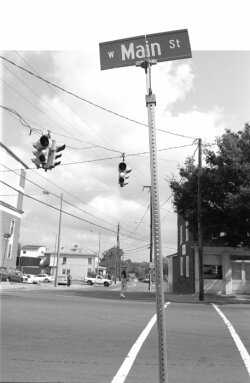Zoned out: Is techy tax break fair?
When the City declared Charlottesville a "technologoy zone" in January 2000, the idea of giving tech companies a tax break encountered little opposition. After all, the so-called internet bubble was still inflating, and these were the businesses that were supposed to lead us all into the new millennium.
Three years later, with the bubble burst and the Dow 2,000 points lower, does such a concept still make sense?
You'd better believe it, says Tom McCrystal, owner of Creative Perspectives, an internet consulting firm, sure thinks so.
"I think it's a mistake to think this was born out of the dot-com craze, and that technology is no longer an important part of our economic community," says McCrystal, who, at the time of the zone's inception, was the head of the Virginia Piedmont Technology Council, an industry group.
And though McCrystal admits that the beliefs behind the creation of such a zone might have been faulty "We're not going to see a return of the predictions of Yahoo at 900 a share," he says he thinks technology is still crucial to maintaining a healthy local economy.
"In Charlottesville," he says, "what we saw was that the big venture-backed tech companies tanked. The real innovation comes from the small companies that don't just employ 100 or 200 people, but employ people in twosies and fivesies and 10s. The companies of that size that survived first the end of the dot-com boom and then the recession are actually stronger than ever."
And hindsight, as usual, is 20/20.
"Companies that had invalid business models went out of business as they should have," he says.
Those that are still in business are reaping the benefit, however. The tax break is a leg up for technology companies, especially those with sky-high sales.
Inside the –zone"– which is the entire City of Charlottesville– tech companies are exempted from the BPOL tax, a levy on annual sales.
The tax itself was implemented to help cover the costs of the War of 1812, says Raymond Richards, Charlottesville's commissioner of the revenue. Although that war ended long ago, the tax stuck and has been a thorn in the side of businesses ever since.
The technology zone idea came up, Richards says, as a way to bypass the BPOL tax and stir interest in tech companies trying to decide where to locate. "We were trying to come up with some way of jazzing things up," says Richards.
In addition to avoiding the annual $35 business license fee, technology companies are charged half the typical tax (companies that gross less than $50,000 pay nothing).
This is not quite the corporate welfare that makes a professional sports team choose, say, Indianapolis over Baltimore. A company grossing a million a year gets a break of $1,800.
Loren Jameson, C.E.O. of Lodestone Games (and husband of Hook proofer Lynn Jameson), says that while the technology zone didn't sway his decision to locate in the city, it did sweeten the deal a bit.
"I would have located downtown no matter what," Jameson says, "but when I went in for my business license and learned that I'd receive a tax break it was a nice surprise."
Not everyone thinks the tech zone is a good idea, however.
"As a city property taxpayer, I think they're kind of throwing away revenue. I can't imagine someone deciding to locate in the city because of that," says developer Richard Spurzem
Richards, however, says it isn't a significant loss for the City. The City has forgone $50,801.76– or 1.2 percent of its usual proceeds since January 1.
Is there any chance other businesses could benefit from a similar tax cut?
"Not right now," says Richards.
